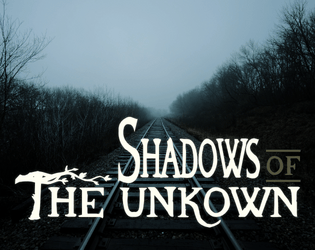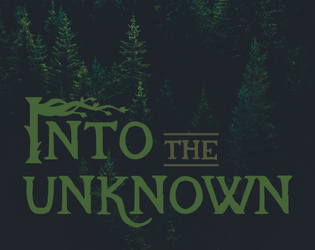I don't care much for caltrop core but I think journalling and abstract combat are a great idea! Good luck!
poetryalpastor
Creator of
Recent community posts
If they were called "Charm" and "Intimidate," how would you figure out what they mean? You would use your natural understanding of those words and interpret the actions based on that, right? What does that tell you about how to interpret them given that they are instead called "Beguile" and "Command"? Hope this helps.
Really well structured, and even though it's fairly standard fantasy fare, I found it really sparked my imagination. I really liked how there's no given answer to a lot of the mysteries. And even though I would probably roll multiple times on each random table, I *think* every possible result still gives enough information; nothing crucial gets locked away in results that don't come up.
Hey! Thanks so much for letting me know you played. Your experience sounds pretty normal; it's possible to play it way faster but most of my games of Fall Of Magic and this take way longer. Can I ask how many people played and how many turns you took per chapter (including the start-of-chapter turn)?
I'm thinking of adding some tips on how to control how long the game takes for the next major update but since even FOM doesn't really have insight on this I didn't have any thoughts ready by the time I wanted to put the game out.
You're right that it's a game that can require a lot of creativity, but I think you're all super cool for trying and I appreciate knowing you played!
I am by no means an official source, but since the game jam says to create a "playable draft," I focused on making a readable document and I figured I would wait until the voting is done to make any changes or add any art if I happen to come up with some, but it also doesn't say that you can't make changes, so maybe you wouldn't have to wait.
I'm sorry; I don't know what you mean by your last sentence. I understand that Belonging Outside Belonging, like PBTA, is not a mechanical classification. I know that PBTA is not a mechanical classification. However, PBTA is also not a thematic classification either, and has only been defined, to my knowledge, as a policy regarding intellectual property, by Vincent and Meguey. As I understand, Belonging Outside Belonging has been defined as more than just an IP policy, by outlining the common threads between Dream Askew and Dream Apart. However, those threads, at least the ones in this forum post, omit things like being GMless, etc., and I'm just curious what other people think about what that implies for games which do not fit into the framework that has been outlined here, but which do play mechanically a lot like Dream Askew, that's all! So far it seems that people generally don't split hairs, which is fine, but to me it raises the question —in that case, why define the framework at all?
Thanks for the thoughtful response! I think I might want to rephrase the first part of my question. I get that it's not so much a pass/fail set of criteria as it is a design intent. However, the threads that have been outlined here that tie Dream Askew and Dream Apart don't include certain mechanical things, such as being GMless, using tokens with weak/regular/strong moves, etc. Because of that, it would be very possible to make a "Belonging Outside Belonging" game that plays very differently from Dream Askew.
Of course, this is true of PBTA as well —Dream Askew itself is a PBTA game that plays a lot differently than Apocalypse World.
But because Vincent Baker hasn't defined (afaik) "PBTA" as anything other than games which take inspiration from AW and decide to use the label for themselves, thematic content is not necessarily one of the uniting threads between all PBTA games, therefore Dungeon World, which is PBTA, and mechanically functions a lot more like AW than Dream Askew does, is much more different thematically to Apocalypse World. Whereas, with Belonging Outside Belonging, it would be possible to make a game that plays very similarly to Dream Askew, and feels very similar mechanically, but which doesn't touch on any of these points. So my question is not so much "what exactly counts as Belonging Outside Belonging," but rather, is this choice to exclude most of Dream Askew's mechanics from the framework of Belonging Outside Belonging, as it has been outlined here, deliberate? And therefore, does that mean that there is theoretically a second lineage of Dream Askew hacks, one that is much more a lineage of "reskinning," for lack of a better word?
So, I haven't read Dream Askew, though I have read some other games that fit into the Belonging Outside Belonging framework.
But, to clarify, does this mean that if someone were to make a game that used certain mechanics defined in Dream Askew (like the token economy with weak/neutral/strong moves, or the way the GM role is distributed among players) but didn't fit into those threads, it would not be a Belonging Outside Belonging game?
To me this makes sense, although I wanted to clarify, partially just to clarify, but also because I'm wondering if it would then be inappropriate to repurpose mechanics from Dream Askew without honouring its specific themes, intents and lineage.










